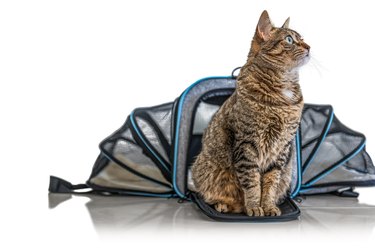Acepromazine maleate, most commonly referred to as acepromazine, is also known by the brand names PromAce and Aceproject. It is widely used as a preanesthetic as well as a tranquilizer for pets. Acepromazine can be prescribed by veterinarians for cats who suffer from anxiety or motion sickness during car rides or for other stressful situations.

Video of the Day
Gabapentin is another medication that is very helpful. One 50- to 100-milligram dose of gabapentin will help a stressed cat to feel more comfortable and relaxed in specific circumstances, such as during visits to the groomer. Alternatively, Feliway pheromone spray or CBD treats can be useful if medication is not your first choice for your cat.
Video of the Day
It is important to discuss the use of these veterinary medicines with your veterinarian since they are only available by prescription. They will be able to advise on the correct dose of acepromazine for your cat.
How acepromazine works in cats
Acepromazine works by changing the chemicals in your cat's brain to change their behavior. Although the exact mechanism for how the drug works is not confirmed, it is believed that acepromazine blocks the brain's dopamine receptors. Ultimately, the use of acepromazine depresses the central nervous system, acting as an effective and popular tranquilizer for cats and dogs alike.
Though it produces great sedative effects and can reduce your cat's heart rate, it does not do anything to relieve pain. However, it has great anti-nausea effects. In addition to helping with motion sickness, acepromazine helps keep a stable heart rhythm, which is especially useful for an easily frightened, skittish cat. It's popular among veterinarians as a sedative given to pets in preparation for general anesthesia.

Safely using acepromazine for your cat
When your veterinarian uses acepromazine, it may be in its injectable form. Tablets in 5-milligram, 10-milligram, and 25-milligram dosages make it handy for home administration. It takes approximately 45 minutes to an hour for the medicine to take effect, and when it does, the effects usually last between six and eight hours. If your cat is taking other sedatives, the veterinarian will take that into account when developing the prescription.
The veterinarian may recommend a test run of acepromazine to ensure the dose is effective, often starting with the smallest dose possible according to your cat's body weight, age, and general health to achieve the desired effect. For example, if you are taking a road trip with your cat, the veterinarian may suggest you administer a small dose several days prior to the trip to make sure the dose is adequate for your cat. If not, you and the veterinarian will have time to determine the proper dosage.
Side effects of acepromazine in cats
Rarely, a cat will exhibit aggressive behavior while on acepromazine. More common is the appearance of the cat's third eyelid. Though the appearance of this seldom-seen part of your cat's eye is alarming if you have never caught sight of it, don't worry because it is a normal reaction to this tranquilizer and has no harmful effect on your cat.
Other potential adverse effects include low blood pressure, loss of coordination, constipation, seizures, vomiting, hypotension, bradycardia, and shock. Your cat's body temperature may drop on acepromazine, so provide them with a blanket or a warm spot when they are on this medication.

Contraindications of acepromazine in cats
A cat with heart disease should be cautious using acepromazine, given its potential effects on blood pressure. A cat who is prone to seizures should avoid this medication, as should one with anemia, liver disease, or kidney disease. Acepromazine can interact with a variety of medications, including some antibiotics, such as neomycin; barbiturate drugs, such as phenobarbital; antacids; antidiarrheals; epinephrine; and the heart medication quinidine.